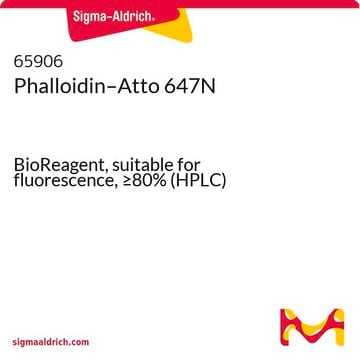19083
Phalloidin–Atto 550
suitable for fluorescence
Se connecterpour consulter vos tarifs contractuels et ceux de votre entreprise/organisme
About This Item
Code UNSPSC :
12352116
Nomenclature NACRES :
NA.32
Produits recommandés
Pureté
≥90% (HPLC)
Niveau de qualité
Forme
solid
Poids mol.
Mw 1476 g/mol
Fabricant/nom de marque
ATTO-TEC GmbH
λ
in methanol
Absorption UV
λ: 552-558 nm Amax
Adéquation
suitable for fluorescence
Température de stockage
−20°C
Catégories apparentées
Description générale
Atto 550 is a new label with high molecular absorption (120.000) and quantum yield (0.80) as well as sufficient stoke′s shift (excitation maximum 554 nm, emission maximum 576 nm). Atto 550 can be used with similar excitation source and fluorescence filters as Cy3 TM and is characterized by a high photostability.Phalloidin is a fungal toxin isolated from the poisonous mushroom Amanita phalloides. Its toxicity is attributed to the ability to bind F actin in liver and muscle cells. As a result of binding phalloidin, actin filaments become strongly stabilized. Phalloidin has been found to bind only to polymeric and oligomeric forms of actin, and not to monomeric actin. The dissociation constant of the actin-phalloidin complex has been determined to be on the order of 3 x 10–8. Phalloidin differs from amanitin in rapidity of action; at high dose levels, death of mice or rats occurs within 1 or 2 hours.
Application
Fluorescent conjugates of phalloidin, rhodamine-phalloidin staining reagents, such as Phalloidin–Atto 550 are used to label actin filaments for histological applications. Some structural features of phalloidin are required for the binding to actin. However, the side chain of amino acid 7 (g-dihydroxyleucine) is accessible for chemical modifications without appreciable loss of affinity for actin.
Informations légales
This product is for Research use only. In case of intended commercialization, please contact the IP-holder (ATTO-TEC GmbH, Germany) for licensing.
Code de la classe de stockage
11 - Combustible Solids
Classe de danger pour l'eau (WGK)
WGK 3
Point d'éclair (°F)
Not applicable
Point d'éclair (°C)
Not applicable
Certificats d'analyse (COA)
Recherchez un Certificats d'analyse (COA) en saisissant le numéro de lot du produit. Les numéros de lot figurent sur l'étiquette du produit après les mots "Lot" ou "Batch".
Déjà en possession de ce produit ?
Retrouvez la documentation relative aux produits que vous avez récemment achetés dans la Bibliothèque de documents.
Les clients ont également consulté
N Panchuk-Voloshina et al.
The journal of histochemistry and cytochemistry : official journal of the Histochemistry Society, 47(9), 1179-1188 (1999-08-17)
Alexa 350, Alexa 430, Alexa 488, Alexa 532, Alexa 546, Alexa 568, and Alexa 594 dyes are a new series of fluorescent dyes with emission/excitation spectra similar to those of AMCA, Lucifer Yellow, fluorescein, rhodamine 6G, tetramethylrhodamine or Cy3, lissamine
Smart-aggregation imaging for single molecule localization with SPAD cameras.
Gyongy, I.; et al.
arXiv (2016)
A Choidas et al.
European journal of cell biology, 77(2), 81-90 (1998-12-05)
The product of a GFP-actin gene fusion, permanently or transiently transfected in diverse mammalian cell lines, was shown to be a suitable, intrinsic probe of both the organization and dynamics of the actin cytoskeleton. In live Swiss 3T3 and NIH
Lorraine Montel et al.
Biophysical journal, 117(3), 408-419 (2019-07-16)
Phagocytosis by macrophages represents a fundamental process essential for both immunity and tissue homeostasis. It consists in the uptake of pathogenic or cellular targets larger than 0.5 μm. For the biggest particles, the phagocytic process involves a massive reorganization of
Blanca Pijuan-Sala et al.
Nature, 566(7745), 490-495 (2019-02-23)
Across the animal kingdom, gastrulation represents a key developmental event during which embryonic pluripotent cells diversify into lineage-specific precursors that will generate the adult organism. Here we report the transcriptional profiles of 116,312 single cells from mouse embryos collected at
Notre équipe de scientifiques dispose d'une expérience dans tous les secteurs de la recherche, notamment en sciences de la vie, science des matériaux, synthèse chimique, chromatographie, analyse et dans de nombreux autres domaines..
Contacter notre Service technique





